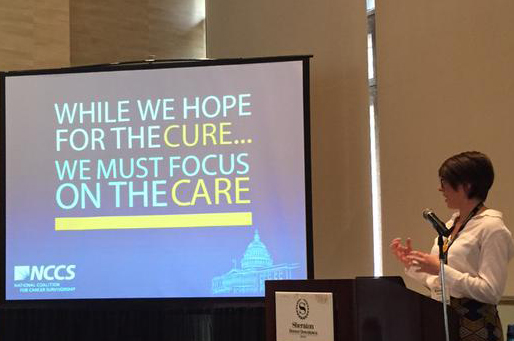NCCS Policy and Advocacy Manager Kelsey Nepote Attends and Presents at CancerCon: Takeaways and Steps for Moving Forward
Over the weekend, I had the pleasure of attending and presenting at Stupid Cancer CancerCon in Denver, Colorado. Stupid Cancer is the largest US-based charity that comprehensively addresses young adult cancer through advocacy, research, support, outreach, awareness, mobile health, and social media. CancerCon is their yearly conference and social networking event for the young adult cancer movement. This year, CancerCon had approximately 600 attendees comprised of survivors, caregivers, oncology professionals, and patient advocates who brought a level of engagement and participation that I have not experience in any other conference that I have attended. The energy and hunger for information was palpable.

Post by Kelsey Nepote, MSW. Kelsey presented the session “The Patient Advocate: Changing Cancer Care in the US.”
The first full day of the conference began with a keynote by Daniel Shapiro, PhD discussing how cancer patients, and specifically young adult cancer patients, are portrayed on television. His presentation illustrated the difference between reality and the dramatization of reality. Following the keynote were concurrent breakout sessions and I chose to attend, What’s Work Got to Do With It? Part I: Working Through Treatment & Taking Time Off. This session was given by Rebecca Nellis, MPP from Cancer and Careers and Jonanna Morales, Esq. from Triage Cancer. NCCS has long been involved in advocacy efforts to combat discrimination in the workplace for cancer survivors which peaked my interest in this topic. Ms. Nellis and Ms. Morales discussed the role of the Americans with Disabilities Act (ADA), State Fair Employment Laws, and the Family Medical Leave Act (FMLA) among other topics. As 41 percent of cancer survivors are diagnosed at “working age” this topic is especially important to the young adult cancer population.
The second breakout session I attended was, Navigating the Young Adult Cancer Journey, led by Alexandra Gubin, MSW, LCSW-C, Krissy Kraczkowsky, MPH, MA, and Gina DeFillippo (YA Acute Myeloid Leukemia Survivor). This session highlighted a great partnership between Johns Hopkins’ Sidney Kimmel Cancer Center and the Ulman Cancer Fund for Young Adults. This partnership helps young adults with a cancer diagnosis during treatment and thrive into survivorship.
To close out the first day, I presented, The Patient Advocate: Changing Cancer Care in the US. It can be challenging to be scheduled to speak during the last break out session of a day but I was pleasantly surprised when nearly 50 attendees showed up to learn about their role in changing the cancer care system. The presentation discussed self-advocacy and public interest advocacy and provided some actions for the attendees to consider. The audience participation and engagement was phenomenal.
When discussing the role of self-advocacy, I asked the attendees to participate in an activity that would identify their superhero pose (or power pose). There is often a misconception that self-advocacy means waving a banner, giving speeches, and taking to the ramparts. While it can include some of these components, in the personal context it means that you arm yourself with the tools and skills necessary to feel comfortable about asserting yourself and communicating clearly about your cancer care needs. It ultimately means that you are taking responsibility and assuming some control of your life circumstances with cancer. Self-advocacy looks different from person to person and it is important that we give ourselves permission to find what actions best fit us, our situation, and our environment. In order to begin to identify the attendees self-advocacy style, I asked them to stand with me and strike their best superhero pose. This was my favorite conference moment.
On the topic of public interest advocacy, we discussed how everyone who is diagnosed with cancer is impacted by public policy. We also discussed the role of story-telling as a way to illustrate the many issues that can impede on survivors receiving the best possible cancer care. Perhaps the most astounding revelation I had at the conference was when I began discussing care coordination and survivorship care planning. I inaccurately assumed that the majority of the audience would know what a survivorship care plan was and at least some would have received one at the end of their treatment. Out of about 50 audience members, close to five people raised their hands when I asked if they knew what a survivorship care plan was and only few remained when I asked if they received one. The vast majority of the audience had never heard of this important cancer care component. I was stunned, frustrated, and saddened. The young adult cancer population will be survivors for the majority of their lives and they are not receiving summaries of their treatment with a coordinating care plan upon ending treatment. This is unacceptable.
NCCS is committed to continuing to work with this population and provide education around care coordination and survivorship care planning. This was just the beginning of a much broader conversation with our young adult cancer survivor partners. Thank you Stupid Cancer for inviting us to participate in this year’s CancerCon.



